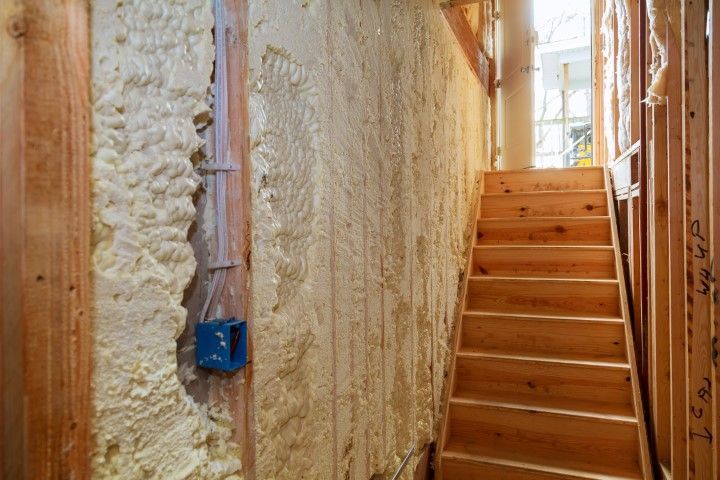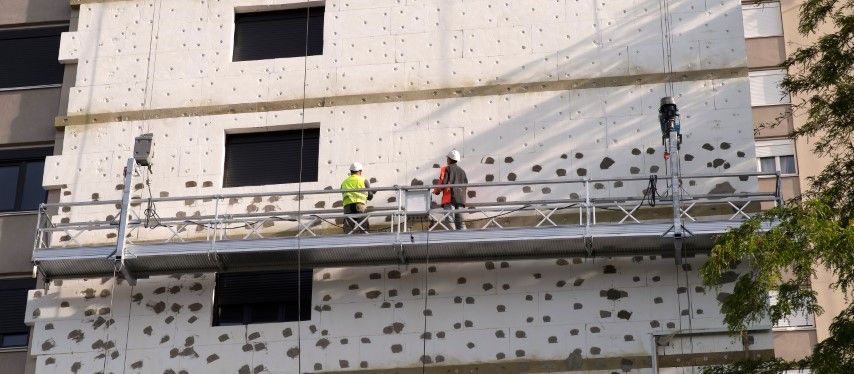Coeur d'Alene Foam Solutions
(208) 427-3536
Commercial Insulation in Coeur d'Alene ID
Running a business comes with its own set of challenges, one of the biggest being managing operating costs. As energy prices continue to rise, many businesses are looking for ways to cut down on their energy consumption without sacrificing productivity or comfort. One solution that can make a significant difference is investing in commercial insulation. Insulation can improve energy efficiency, help regulate indoor temperatures, and reduce the strain on your heating and cooling systems.
Commercial insulation in Coeur d'Alene, ID plays a crucial role in lowering business operating costs.
Improved Energy Efficiency
Energy costs are one of the most significant expenses for businesses, especially during extreme weather conditions. Without proper insulation, buildings tend to lose heat in the winter and become too hot in the summer. This means your heating and cooling systems need to work harder to maintain a comfortable temperature, which results in higher utility bills. Commercial insulation helps by acting as a barrier that prevents energy loss, ensuring that the building stays at a consistent temperature. This can dramatically reduce the amount of energy needed to heat or cool your business, ultimately lowering your energy bills.
Reduced Strain on HVAC Systems
Over time, HVAC systems can experience wear and tear due to constant use. When a building is not insulated properly, these systems have to work overtime to regulate indoor temperatures, leading to faster wear and a need for more frequent repairs or replacements. With high-quality insulation, your HVAC systems can work more efficiently and require less maintenance. This can lead to significant savings on repair costs and extend the lifespan of your heating and cooling equipment, further lowering your overall operational expenses.

Enhanced Comfort for Employees and Customers
A comfortable work environment is essential for productivity and customer satisfaction. Insulation not only helps regulate temperatures but also reduces drafts, noise, and humidity levels. By ensuring that your business stays comfortable year-round, you create a pleasant atmosphere for both employees and customers. A comfortable environment can lead to higher employee morale, improved focus, and increased customer satisfaction, all of which contribute to better business outcomes and reduced operating costs.
If you're ready to lower your business operating costs and improve energy efficiency, we’re here to help. Our team specializes in providing high-quality commercial insulation services in Coeur d'Alene, ID. Get in touch with us today to schedule a consultation and discover how insulation can make a lasting difference for your business.

Understanding the Different Insulation Methods for Commercial Spaces
Insulating
home and commercial spaces is a crucial step in ensuring energy efficiency, comfort, and long-term cost savings. When it comes to commercial buildings, choosing the right insulation method can make all the difference in maintaining a stable internal climate, reducing energy consumption, and enhancing the overall value of the property. With various options available, it’s important to understand the different types of insulation and how each one benefits a commercial space. Each method has its own unique characteristics, benefits, and ideal applications. Let’s explore each of these in more detail.
Fiberglass Insulation
Fiberglass insulation is one of the most widely used types of insulation in commercial buildings. It is made of tiny glass fibers and comes in the form of batt, blanket, or loose-fill insulation. Fiberglass is highly effective at preventing heat transfer, making it a great choice for temperature control in both cold and hot climates.
One of the key advantages of fiberglass is its cost-effectiveness. It offers good thermal resistance while being relatively affordable compared to other insulation materials. Additionally, fiberglass is non-combustible and is available in various thicknesses to suit different building needs. However, it’s important to handle fiberglass properly during installation to avoid skin irritation.
Spray Foam Insulation
Spray foam insulation is a more modern solution, often favored for its superior air-sealing properties. It is sprayed directly onto walls, ceilings, and other surfaces where it expands and hardens, creating a tight seal. This type of insulation is ideal for commercial spaces with irregular shapes or hard-to-reach areas, as the foam fills gaps and crevices where traditional insulation might not fit.
The main benefit of spray foam insulation is its high R-value per inch, which means it provides better thermal resistance compared to many other insulation types. It also helps in reducing air leaks, which can lead to significant energy savings. However, spray foam insulation tends to be more expensive upfront, though it can pay off in the long term due to its effectiveness.
Cellulose Insulation
Cellulose insulation is made from recycled paper products, primarily newspaper, which is treated with a fire-retardant solution. This type of insulation is typically blown into walls, attics, and other cavities in commercial buildings. Cellulose is considered an eco-friendly option due to its use of recycled materials, making it a great choice for companies looking to implement sustainable building practices.
In addition to its environmental benefits, cellulose insulation is highly effective at blocking heat transfer and sound. It can fill irregular gaps and voids within the structure, offering superior air sealing properties. One downside to cellulose is that it can settle over time, which may require additional maintenance to ensure it continues to provide optimal performance.
Rigid Foam Board Insulation
Rigid foam board insulation is made from solid polystyrene, polyisocyanurate, or polyurethane. It is often used in commercial buildings for insulating exterior walls, foundations, and roofs. Rigid foam board comes in large sheets, which are easy to handle and install. These boards offer excellent thermal resistance and are moisture-resistant, making them a good choice for spaces that are exposed to high levels of moisture or fluctuating temperatures.
One of the significant benefits of rigid foam board insulation is its high compressive strength, which allows it to be used in areas where other insulation types might not hold up, such as in flooring or beneath concrete slabs. The downside is that it can be more expensive than fiberglass or cellulose, and it may require specialized equipment for installation.
Choosing the right insulation for your commercial property is essential to maximizing energy efficiency and comfort. With various options available, it's important to consult with experts who can guide you in selecting the method that best suits your building’s needs and your budget. If you are ready to enhance the insulation of your commercial space, don't hesitate to get in touch with us today. We can help you assess your building’s insulation requirements and recommend the best solution for your needs.
Energy Saving Strategies: How Insulation Can Cut Your Business Expenses
Energy efficiency is a critical consideration for businesses aiming to reduce their operating costs and improve their environmental footprint. One of the most effective ways to achieve these goals is by investing in insulation. Proper insulation not only enhances the comfort of your workplace but also plays a significant role in reducing energy consumption.

Improved Temperature Regulation
A well-insulated building ensures that your heating and cooling systems work more efficiently by maintaining a consistent indoor temperature. Without proper insulation, your business may experience fluctuating temperatures, which can cause HVAC systems to run longer and use more energy. By insulating an
attic, walls, ceilings, and floors, businesses can maintain comfortable temperatures without the constant need to adjust heating or cooling settings. This leads to less energy consumption and significantly lower utility bills over time.
Reduced Heat Loss and Gain
One of the primary benefits of insulation is its ability to minimize heat loss during the colder months and heat gain during the warmer months. In winter, insulation helps keep the heat produced by your HVAC system inside, preventing it from escaping through walls, ceilings, or windows. Similarly, in the summer, insulation works to block the heat from the outside, allowing your cooling system to maintain a cooler environment with less effort. By limiting both heat loss and heat gain, insulation ensures that your energy systems are not overworked, saving you money.
Lower HVAC System Demand
Insulation can drastically reduce the demand on your heating, ventilation, and air conditioning (HVAC) system. When insulation is installed correctly, it acts as a barrier against external temperatures, allowing your HVAC system to function less frequently and for shorter periods. This not only lowers energy consumption but also extends the lifespan of your HVAC equipment, reducing the need for costly repairs and replacements. Fewer breakdowns and a longer lifespan for your HVAC system means less money spent on maintenance.
Soundproofing and Reduced Noise Pollution
While insulation is often recognized for its thermal benefits, it also provides excellent soundproofing properties. For businesses that operate in noisy environments or have office spaces where concentration is key, reducing sound pollution can lead to better productivity. With fewer distractions from outside noises, employees can focus on their tasks more effectively, leading to a more efficient work environment. Additionally, noise-reducing insulation reduces the need for additional equipment to control sound, further reducing expenses.
Insulation is an investment that pays off over time. By improving temperature regulation, reducing heat loss and gain, lowering HVAC system demand, and providing soundproofing benefits, insulation can significantly cut your business expenses. If you are ready to take the next step in improving your energy efficiency and reducing operating costs, contact us today. Our team of experts is here to help guide you through the process and offer tailored solutions for your business's specific needs. Let’s work together to create a more energy-efficient, cost-effective, and comfortable environment for your business.